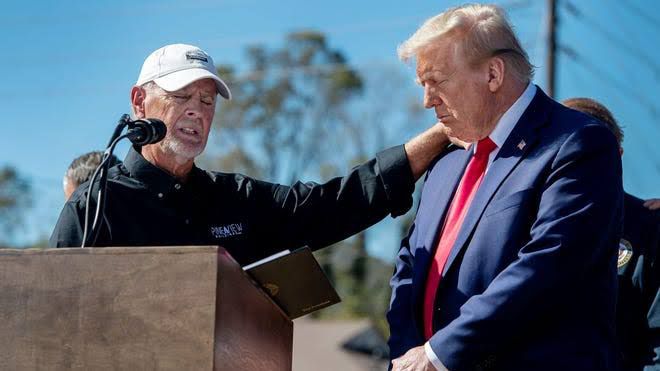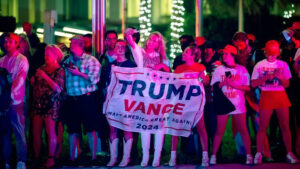
In a recent rally held in New York, former President Donald Trump found himself at the center of a political firestorm after making remarks that many have labeled as racist. Despite widespread condemnation, Trump defended the event, describing it as a “love fest” among his supporters.
The rally, attended by thousands of his ardent followers, featured a blend of familiar Trump rhetoric, touching on themes such as immigration, law and order, and economic revival. However, it was his comments regarding specific racial and ethnic groups that ignited backlash from both political opponents and some members of his own party. Critics pointed out that his language was not only incendiary but also reminiscent of the divisive tactics that characterized his presidency.
During the rally, Trump remarked on the “invasion” of migrants, suggesting that they were responsible for rising crime rates and economic decline in the United States. His supporters cheered loudly, but many others viewed his words as a thinly veiled attempt to scapegoat communities of color for broader societal issues. The phrase “love fest,” which Trump used to describe the atmosphere at the rally, struck many as ironic, given the charged nature of his statements.
Political analysts are closely monitoring the fallout from this event as it unfolds in the context of the upcoming 2024 presidential elections. Trump’s remarks could polarize voters further, drawing in supporters who resonate with his message while alienating moderate Republicans and independents. Notably, his past behavior suggests a pattern of appealing to racial anxieties, which has sparked discussions about the long-term impact on the GOP’s image.
Key figures in the Democratic Party have quickly condemned Trump’s comments. House Minority Leader Hakeem Jeffries called the remarks “dangerous and divisive,” asserting that they undermine the fabric of American society. He emphasized the importance of unity and inclusivity in contrast to Trump’s rhetoric, which he described as a direct threat to the nation’s diversity.
However, Trump remains unfazed by the criticism. In a follow-up statement, he characterized the backlash as a “politically motivated witch hunt” aimed at silencing his supporters. He insists that his comments are taken out of context and that his intention is to address genuine concerns about national security and the economy. This defense echoes his long-standing strategy of framing criticism as a tool used by his opponents to undermine his political influence.
Supporters of Trump argue that his words resonate with many Americans who feel disillusioned by the current administration’s policies on immigration and crime. They contend that he is merely speaking the truth about issues that matter to everyday citizens. This divide underscores the growing polarization in American politics, where language and rhetoric can spark intense reactions depending on one’s political affiliation.
The controversy also reignited discussions about race in America and the role that political leaders play in shaping public discourse. Critics argue that inflammatory rhetoric can incite violence and hate crimes, while supporters claim it reflects the frustrations of a segment of the population that feels unheard.
As the 2024 election approaches, Trump’s rally and its aftermath serve as a reminder of the contentious climate surrounding American politics. The Republican primary field is already crowded, with candidates attempting to carve out their own identities while navigating the complex dynamics of Trump’s influence. Some Republican leaders have attempted to distance themselves from Trump’s rhetoric, while others embrace it, seeking to harness the fervor of his base.
The implications of this rally will likely extend beyond immediate public reaction. Analysts suggest that how candidates handle issues of race and immigration in their campaigns could significantly affect their electoral fortunes. As Democrats prepare to challenge Trump or any other Republican candidate in the upcoming elections, they will need to craft a narrative that not only counters divisive rhetoric but also offers a compelling vision for the future.
In conclusion, Trump’s defense of his New York rally as a “love fest” starkly contrasts with the widespread condemnation of his remarks, highlighting the ongoing divide in American society. As the nation braces for an election cycle that promises to be as contentious as ever, the interplay between race, rhetoric, and political strategy will undoubtedly remain at the forefront of public discourse. The stakes are high, and the conversations sparked by this rally may shape the landscape of American politics for years to come.






